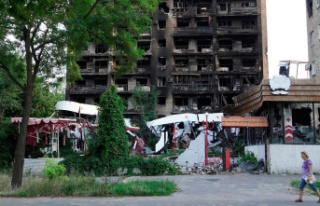In the gas crisis, Germany is discussing the continued operation of the last three remaining nuclear power plants. The fact that the Green Economics Minister, Robert Habeck, has a pragmatic say is a necessary breaking of a taboo. Even if it doesn't suit many Greens.
The word taboo comes from Polynesia. Sailors like James Cook brought it to Europe in the 18th century, thereby filling a gap in our vocabulary: taboos are unquestionably untouchable, and it is often not even allowed to talk about them.
Many citizens in Germany reject nuclear power. The majority of the population, which according to surveys advocates the continued operation of the remaining nuclear power plants, is neither inconsistent nor bigoted, but free of ideology. Gas, petrol and heating oil prices have exploded and Russia's President Vladimir Putin has made it very clear that he intends to use gas as a weapon against Europe.
The EU Commission in Brussels assumes that Putin will stop deliveries in the course of the year. In the worst case, companies or entire sectors would then have to be shut down in this country. No wonder other EU countries are loudly demanding that Germany, the EU's largest customer for Russian gas, delay the nuclear phase-out. After all, Berlin itself is demanding solidarity from other EU countries.
However, Germany is not alone with its energy taboos. The Netherlands sits on one of the largest natural gas reserves in the world, but despite Putin's gas war, they no longer want to tap it. Because production in the Groningen gas field has caused earthquakes - and the sagging soil has already damaged thousands of houses - it is to be phased out this year.
The government in The Hague does not want to shake the exit and also does not want to talk about it. The issue is so sensitive that EU energy ministers were reluctant to raise the issue with their Dutch counterparts at the last crisis meeting.
Politicians also do not want a debate about more gas production in Germany. At the turn of the millennium, fracking still supplied a quarter of the gas demand in Germany. Despite the risks associated with the technology: Now in the crisis would be the time to start funding again - or at least to discuss it. But the federal government doesn't want that, and it's strengthening Putin's position.
Belgium shows that there is another way: the country, which is considered ungovernable elsewhere because of its overly complicated political system, already postponed the planned phase-out of nuclear power in March, almost a month after Russia invaded Ukraine.
There, two power plants that were actually supposed to be shut down are allowed to run for ten years longer. A Green Minister is responsible for Belgium's exit from the exit - even though Belgium hardly consumes Russian gas. This is what solidarity looks like.
"Everything on shares" is the daily stock exchange shot from the WELT business editorial team. Every morning from 7 a.m. with the financial journalists from WELT. For stock market experts and beginners. Subscribe to the podcast on Spotify, Apple Podcast, Amazon Music and Deezer. Or directly via RSS feed.












